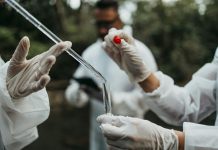
In a recent study, researchers found that a new compound based on iridium can attack the nucleus of cancerous cells when switched on by light.
Iridium is a rare metal which landed in the Gulf of Mexico 66 million years ago. The compound in the metal is hooked onto albumin, a protein in the blood.
The research was conducted by a team from the University of Warwick.
In the study, the new cancer treatment using light is called Photodynamic therapy. It is based on chemical compounds called photosensitizers.
It can be switched on by light to produce oxidizing species, able to kill cancer cells.
Doctors can activate the compound selectively where the tumor is to kill cancer cells and leave healthy cells intact.
In the new study, the team was able to hook up Iridium to the blood protein Albumin, which then glowed very brightly so they could track its passage into cancer cells.
The compound can then be switched on by light irradiation and destroy the cancer cells from their very center.
The team believes if this technology can be translated into the clinic, it might be effective to treat resistant cancers and reduce the side effects of chemotherapy.
One author of the study is Professor Peter Sadler, from the Department of Chemistry at the University of Warwick.
The study is published in Angewandte Chemie International Edition.
Copyright © 2019 Knowridge Science Report. All rights reserved.



